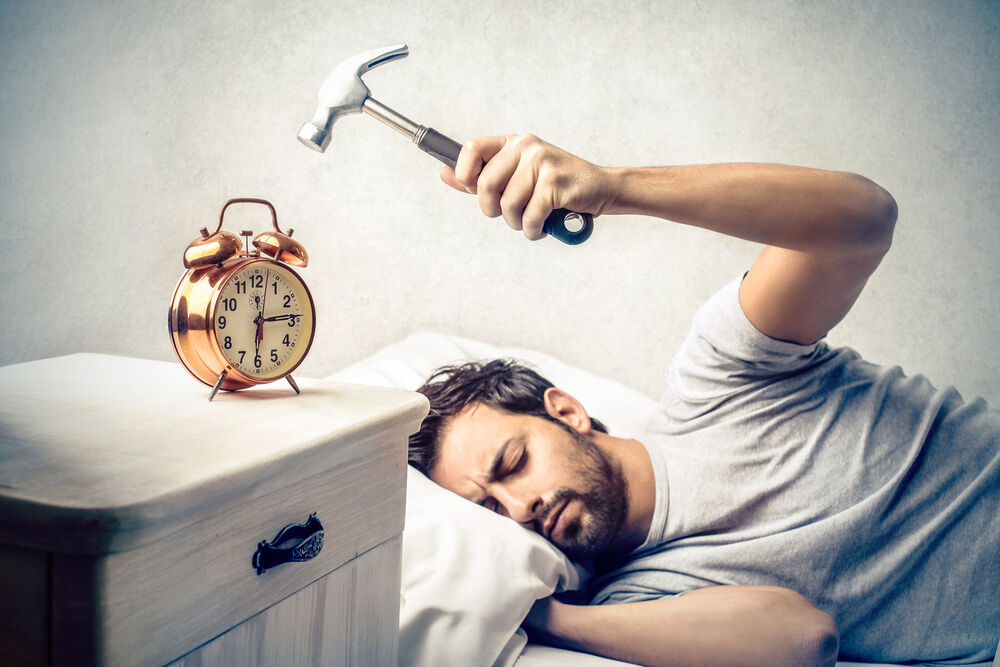It seems like the older you get, the more sleep becomes one of life's greatest pleasures. Sleep is a respite for the mind and a medic for the body. It's your nightly escape from the hustle and bustle—a pause button on life's demands and stresses.
Just thinking about crawling into bed sounds dreamy, doesn't it?
But here’s a wake-up call for everyone: The CDC reports that nearly one-third of American adults are sleep-deprived. What's worse, they're starved for adequate sleep quality —specifically, deep sleep. And a lack of deep sleep can increase the risk of developing chronic conditions such as obesity, diabetes, high blood pressure, heart disease, stroke, and more.
This leads us to our million-dollar question: how much deep sleep do you need?
We've gathered insights from doctors and sleep specialists to bring you the answer below.
How Much Sleep Do You Need?
The CDC recommends that the average adult should get about 7 hours of sleep each night.
But how much sleep your body and brain need will vary as you grow and mature:
- Newborns (0–3 months) – 14–17 hours
- Infants (4–12 months) – 12–16 hours
- Toddlers (1–2 years) – 11–14 hours
- Preschoolers (3–5 years) – 10–13 hours
- School age kids (6–12 years) – 9–12 hours
- Teenagers (13–18 years) – 8–10 hours
- Adults (18–60 years) – 7 or more hours
- Seniors (61 and older) – 7–9 hours
However, those numbers only tell a part of the story because not all sleep serves the same purpose. In fact, during sleep, your body cycles through various sleep stages, and each phase has its unique benefits.
For this reason, it’s not just about getting 7 hours—it's about the quality of those hours during each individual sleep stage. So, to answer the question “how much deep sleep do you need,” we must first develop a better understanding of what getting deep restorative sleep means in relation to these various stages.
The Stages of Sleep
Understandably, most people think of sleep as a binary equation: you're either asleep or you're awake. Yet, sleep science paints a more complex picture. Think less black and white, and more shades of gray. According to sleep scientists:
“The human body cycles through two phases of sleep, (1) rapid eye movement (REM) and (2) non-rapid eye movement (NREM) sleep, which is further divided into three stages, N1-N3. Each phase and stage of sleep includes variations in muscle tone, brain waves, and eye movements.”
Your body cycles through each sleep stage multiple times every night. Each stage serves a distinct purpose in your nightly restorative cycle, taking up a slice of that 7-hour sleep pie. On average, one complete sleep cycle—encompassing all four stages—lasts between 90 minutes to 110 minutes.
Non-Rem
Stages N1 to N3 are characterized as non-rapid eye movement (NREM) sleep. With each stage, your slumber goes “deeper.” Most of your night—around 75%—is spent in NREM sleep, with the N2 stage taking up the lion’s share.
N1 (Light Sleep)
During the light sleep stage, which usually lasts between 1 and 7 minutes, you're just on the edge of sleep. Brain activity, eye movements, and breathing slow down, but full relaxation hasn't set in yet.
Many people experience a sudden jolt at this stage, feeling as though they’re falling. One moment you're close to drifting off, the next your body feels like it's been zapped.
This common albeit unpleasant phenomenon in the N1 stage is known as the hypnic jerk.
Why this occurs isn't entirely clear, but theories range from evolutionary reflexes to unexpected brain activity bursts.
N2 (Deeper Sleep)
Step into N2 and you progress deeper into the sleep labyrinth.
N2 sleep typically lasts from about 10 to 25 minutes during the first sleep cycle, accounting for 45%-55% of total sleep time. During N2, various physiological transformations occur, including:
- Heart rate and breathing decelerate even more
- The eyes stop moving
- A minor drop in body temperature occurs
- Brain waves mellow, interrupted only by occasional rapid oscillations known as sleep spindles and K-complexes
- Muscles ease further into relaxation
These changes allow your body to shift into repair mode with N3.
N3 (Deepest Non-Rem Sleep)
This is where sleep sinks its roots deep. Known as slow-wave sleep (SWS), N3 is characterized by delta waves—low frequencies with high amplitudes pulsing through the brain. Clocking in at 20-40 minutes per cycle, N3 accounts for about 15-25% of your total sleep. Physiological responses include:
- Decreased blood flow to the brain
- Increased blood flow to muscles
- Further decreases in blood pressure and heart rate
- Reduced responsiveness to external stimuli such as noise and light
At this stage, you enter a state known as sensory gating—a process by which the brain blocks out all but the most important or threatening messages, which contributes to deep sleep during N3. Once in this sensory gate, your body can fully focus on repairing itself; growth hormones are released, tissues regenerate, the immune system gets a much-needed boost, and bone and muscle building kicks into higher gear.
REM Sleep
The final sleep phase, known as the Rapid Eye Movement (REM) stage, is where dreams take flight. REM accounts for approximately 25% of your sleep.
At this point, your eyes begin to move rapidly even though your lids are still closed. Brain activity spikes as though you were awake, except your body enters a state of paralysis to protect you from acting out your dreams.
REM sessions aren’t uniform. The first kicks in about 90 minutes after you nod off and lasts a brief 10 minutes. Subsequent cycles extend REM, with the final episode going for almost an hour.
During REM, your brain's not just idly dreaming; it's sorting, storing, and even problem-solving.
Deep Sleep Quotas
So, how much deep sleep do you need?
As discussed, "deep sleep" is a relative term, encompassing various stages from deeper sleep (N2) to the deepest non-REM sleep (N3), and even REM—often considered the deepest sleep state of all. So, for a balanced, restorative night in a 7-8 hour sleep cycle, aim for:
- 3.5-4.5 hours of N2
- 1.5-2 hours of N3
- 1.5-2 hours of REM
Hitting these quotas is your ticket to restful sleep so that you feel, recharged and ready to tackle the day ahead.
The Benefits of Sleep
Why does it matter that you get enough deep sleep?
Think of sleep as your body's nightly tune-up, a necessary ritual that keeps both your physical and mental machinery running smoothly. Neglect it, and you're sidelining one of nature's most potent healers. Advantages include:
- Self-healing – Sleep provides active maintenance for both your brain and body. Deep sleep stages, particularly N3, trigger the release of growth hormones for tissue repair and muscle building. But that's not all—your emotional traumas and stressors get processed during REM sleep, equipping you mentally for the day ahead.
- Reducing your risk for serious health problems – Want to sidestep health issues like diabetes and heart disease? Proper sleep can be your secret weapon, helping to regulate blood sugar levels and keep your heart ticking smoothly.
- Getting sick less frequently – Adequate rest equips your body to fend off viruses and bacteria. Put simply, more sleep makes you less susceptible to getting sick.
- Staying at a healthy weight – You might be surprised to learn that there are links between weight gain and sleep. A lack of sleep can impact the hormones that control hunger, thus making you more prone to weight gain.
- Reducing stress and improving your mood – A bad night's sleep can make anyone cranky, and prolonged poor sleep quality could even contribute to worsened mental health. On the contrary, the benefits of proper rest go deeper. Sleep helps to balance your mood and decompress your mind, reducing stress and anxiety.
- Thinking more clearly – From acing exams to crushing meetings, a solid night's sleep can enhance your cognitive function and improve your focus, memory, and problem-solving abilities.
- Improving social interactions – Grumpy from lack of sleep? It's not just you. And it can impact your social interactions too. Adequate rest improves your emotional intelligence, making interpersonal relationships less stressful and more harmonious.
- Making good decisions and avoiding injuries – Sleep deprivation isn't just unpleasant—it can also be dangerous. Drowsy driving alone causes thousands of accidents yearly. Proper sleep keeps your reaction times sharp, making you less prone to errors and accidents.
How Do You Get Better Sleep?
No two sleepers are the same. Some people may be able to fall asleep the moment their head hits the pillow, whereas others may toss and turn before they conk out. That said, there are steps you can take to get a better night’s sleep, including:
- Sticking to a consistent sleep schedule
- Going to bed before midnight
- Avoiding blue light before bedtime
- Creating a nightly wind-down routine
- Limiting caffeine, stimulants, and heavy meals before bedtime
- Trying relaxation techniques
- Taking natural sleep aids
- Exercising at least an hour each day
- Getting a sleep tracker to track your overall sleep time/performance
- Investing in better a mattress and bedding
Sleep Better with Mancini’s Sleepworld
For busy adults, deep sleep isn't a luxury—it's a necessity. Aim for a 7–8 hour sleep routine that includes ample N2, N3, and REM sleep to wake up feeling genuinely restored.
And, consider this: you spend roughly a third of your life asleep. Isn't it time you invest in a mattress that maximizes that precious downtime? After all, your mattress should be more than just a resting pad. The right one can be your nightly refuge. Don't underestimate the role it plays in your sleep quality.
At Manicini’s Sleepworld, our team of mattress matchmakers is here to guide you on the path to perfect sleep. Whether you prefer a soft or hard mattress, are a back or side sleeper, or want memory foam or innerspring, we can help you find your next bed—and years of quality sleep.
Sources:
- CDC. 1 in 3 adults don’t get enough sleep. https://www.cdc.gov/media/releases/2016/p0215-enough-sleep.html.
- NIH. Physiology, Sleep Stages. https://www.ncbi.nlm.nih.gov/books
- Cleaveland Clinic. Sleep. https://my.clevelandclinic.org/health/articles/12148-sleep-basics
- Health.Gov. Get Enough Sleep. https://health.gov/myhealthfinder/healthy-living/mental-health-and-relationships/get-enough-sleep

